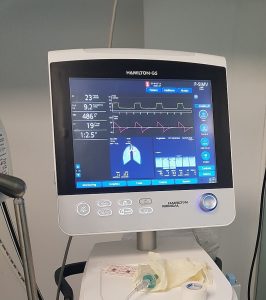 A deeply tragic case has recently emerged in the news concerning a pregnant woman in Georgia, Adriana Smith, who has been declared brain dead. The hospital is keeping her on life support in order to protect the life of her unborn child, with hopes of delivering the baby around 32 weeks gestation.
A deeply tragic case has recently emerged in the news concerning a pregnant woman in Georgia, Adriana Smith, who has been declared brain dead. The hospital is keeping her on life support in order to protect the life of her unborn child, with hopes of delivering the baby around 32 weeks gestation.
It is a rare situation to have a brain-dead pregnant woman on life support for any amount of time. What is most unusual about this particular case, is that the woman was only 9 weeks pregnant when life support began. She has already been on life support for 3 months, so there are still over 2 more to go. In a study of 30 reported cases worldwide from 1982-2010, the average duration of support was only 38 days, with the longest case lasting 107 days. Notably, in 12 of the 19 cases that reported outcomes, healthy babies were delivered with only one instance of congenital defects. The longest documented case that delivered a viable baby was for 117 days in 2019, starting at 16 weeks of pregnancy, with no birth defects reported after a one-year follow-up.
Media coverage of Smith’s situation has highlighted the heartbreaking aspect that the hospital’s decision to continue life support is against the apparent wishes of the family. The family is citing concern about the cost, the possibility of birth defects, and the emotional toll of keeping someone on life support who has no chance of recovery. While that situation is obviously tragic, what is most disconcerting about the reporting on this case is that what is being blamed is Georgia’s recent LIFE act, a law banning abortion after cardiac activity is detected—around 6 weeks. The primary narrative around this case is that the whole situation is the fault of pro-life laws that should be repealed.
The truth is that removing a pregnant woman from life support, which would inevitably result in the death of the unborn child, is not an abortion. This distinction holds true both in the Catholic understanding of abortion, as well as the legal definition under Georgia’s state law. Georgia’s Attorney General, Chris Carr, released a statement saying, “There is nothing in the LIFE act that requires medical professionals to keep a woman on life support after brain death,” emphasizing that “removing life support is not an action ‘with the purpose to terminate a pregnancy.’” Thus, the hospital’s actions are simply in line with state laws that prioritize the protection of life, rather than being a consequence of abortion legislation.
The legal framework surrounding this case actually pertain to a state’s general interest in protecting life. In fact, several states have laws that stipulate living wills requesting the removal of life support should be disregarded if the patient is pregnant and the fetus is deemed viable. Ohio is one of those states. Georgia is also one of those states, although Georgia has the additional exception that the mother could have life support removed if she specifically included the situation of pregnancy in her living will. Absent such a directive, that decision may finally rest with the courts. In the meantime, it appears the hospital is following their applicable state laws, which are completely unrelated to abortion restriction.
Concerning Catholic teaching on this case, there is no direct teaching on life support and pregnancy. Instead, we must consider the specifics of the individual case, and make prudential judgments. Importantly, we must recognize this case is not about abortion, despite claims from the family and certain media outlets. Catholic teaching emphasizes the need to consider the well-being of both patients—the mother and child—not just one. It is noteworthy that while concerns about possible birth defects are a focal point in the media, historical cases reported above suggest that this situation frequently results in the birth of a completely healthy baby. Regardless, the potential for birth defects does not justify ending a child’s life.
Cost is another concern raised by the family. The financial implications of such medical care can vary widely based on many factors, including insurance coverage, making it difficult to ascertain the actual cost. What we do know, however, is that the family established a GoFundMe page that has raised over $125,00 thus far, indicating there is a community willing to support them in this time of need.
The case of Adriana Smith underscores the ethical complexities surrounding life support for brain-dead pregnant women. It challenges us to navigate the delicate balance between respecting the sanctity of life and addressing the emotional and financial burdens faced by families in such tragic circumstances. As society grapples with these issues, it is vital to uphold the dignity of both mother and child, ensuring that decisions are made with compassion and a deep respect for life at all stages.
